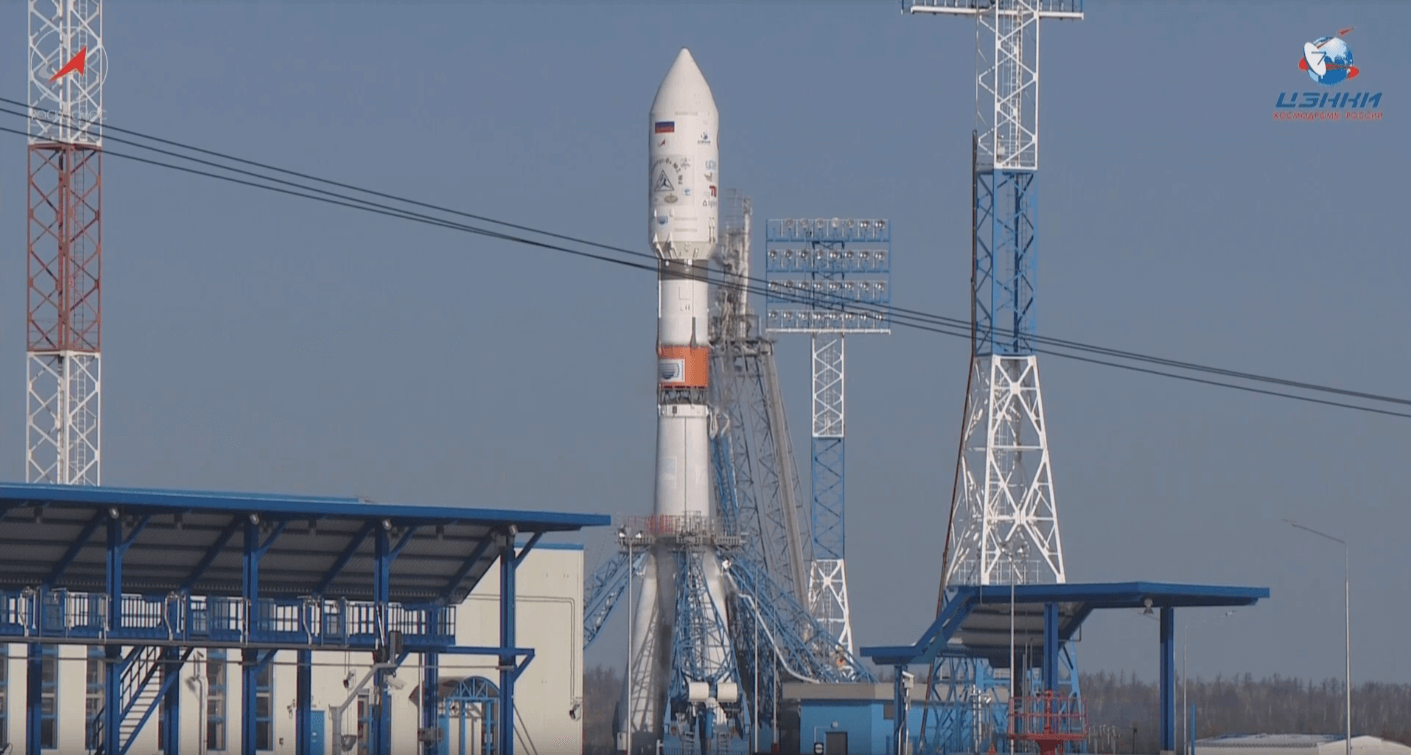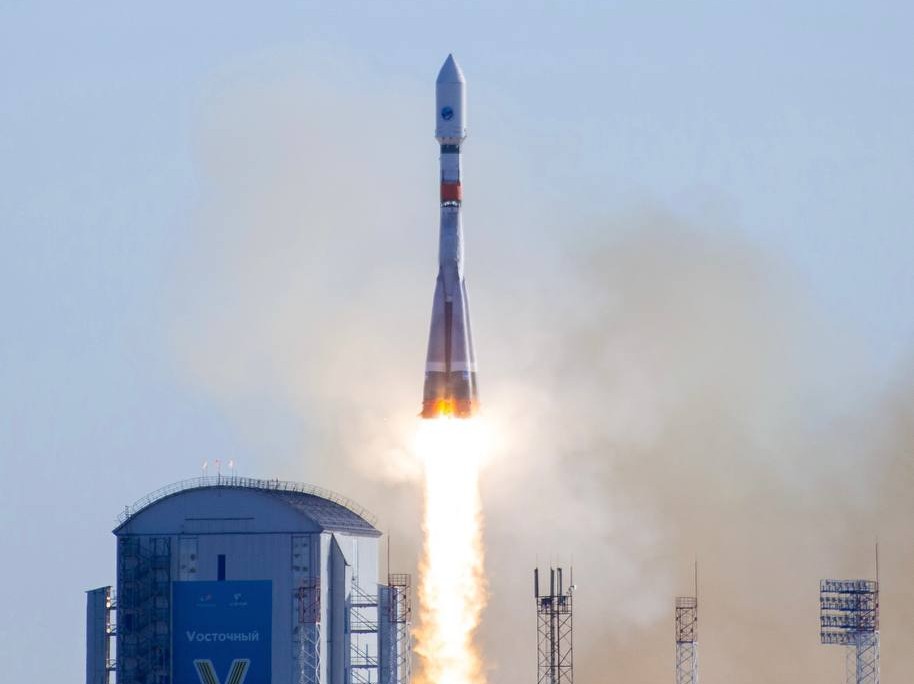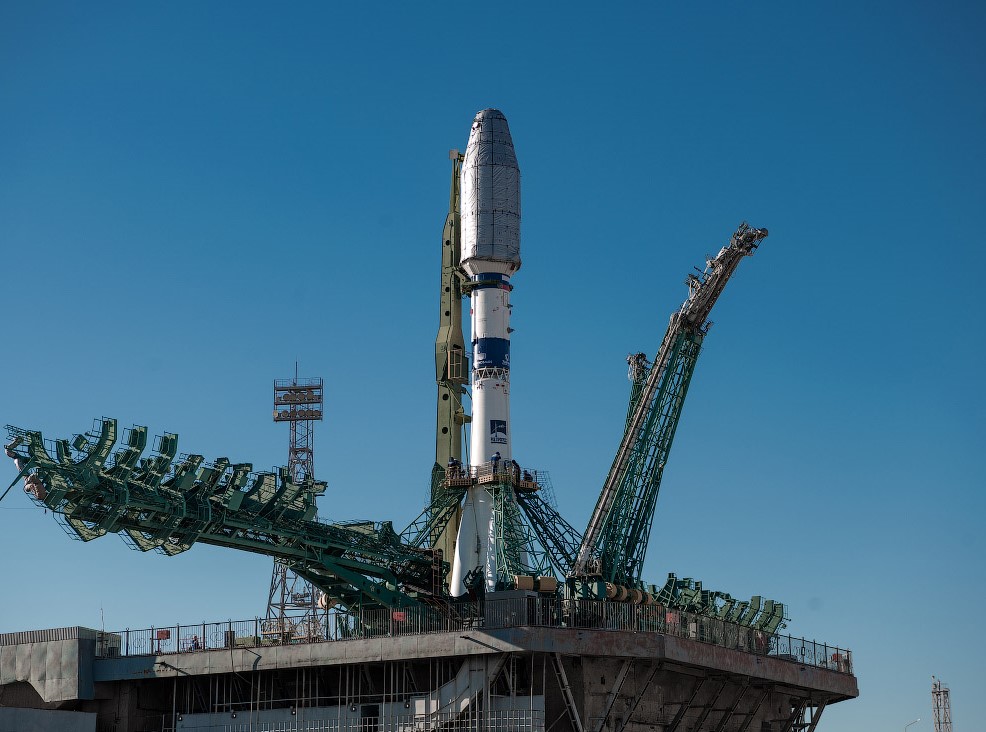
Soyuz 2.1a/Fregat-M
ActiveProgress Rocket Space Center (PRSC)
Oct. 19, 2010
Description
The 2.1a version includes conversion from analog to digital flight control system and uprated engines on the booster and the first stage with improved injection systems. The new digital flight control and telemetry systems allow the rocket to launch from a fixed rather than angled launch platform and adjust its heading in flight. A digital control system also enables the launch of larger commercial satellites with wider and longer payload fairings such as the ST-type fairing. These fairings introduce too much aerodynamic instability for the old analog system to handle.
Specifications
-
Stages
3 -
Length
46.3 m -
Diameter
2.95 m -
Fairing Diameter
― -
Launch Mass
312 T -
Thrust
4149 kN
Family
-
Name
Soyuz 2.1a/Fregat-M -
Family
― -
Variant
Fregat-M -
Alias
― -
Full Name
Soyuz 2.1a Fregat-M
Payload Capacity
-
Launch Cost
$80000000 -
Low Earth Orbit
7020 kg -
Geostationary Transfer
Orbit
― -
Direct Geostationary
― -
Sun-Synchronous Capacity
―
Progress Rocket Space Center
Commercial
Dmitry Baranov
PRSC 1996Progress Rocket Space Centre, formerly known as TsSKB-Progress, is a space science and aerospace research company which is known for manufacturing launch vehicles and satellites. Most notably, Progress Rocket Space Centre is the manufacturer of Soyuz launch vehicles.
Upcoming Spaceflights
Soyuz 2.1a/Fregat-M | Kondor-FKA No.2
Progress Rocket Space Center | RussiaVostochny Cosmodrome, Siberia, Russian Federation
TBD June, 2024
Status: To Be Determined
Mission:
The Kondor-FKA is a small civilian radar Earth observation satellite designed by NPO Mashinostroyeniya as a civilian counterpart to the Kondor-E satellite. The Kondor satellite features a S-band synthetic aperture radar (SAR), which can conduct both continous swath surweys or detailed spot surveys. The swath width is 10 km. Ground resolution is 1 to 2 m in spotlight mode, 1 to 3 m in stripmap mode and 5 to 30 m in ScanSAR mode.
Sun-Synchronous OrbitSoyuz 2.1a/Fregat-M | Kondor-FKA No.1
Progress Rocket Space Center | RussiaVostochny Cosmodrome, Siberia, Russian Federation
May 26, 2023, 9:14 p.m.
Status: Launch Successful
Mission:
The Kondor-FKA is a small civilian radar Earth observation satellite designed by NPO Mashinostroyeniya as a civilian counterpart to the Kondor-E satellite. The Kondor satellite features a S-band synthetic aperture radar (SAR), which can conduct both continous swath surweys or detailed spot surveys. The swath width is 10 km. Ground resolution is 1 to 2 m in spotlight mode, 1 to 3 m in stripmap mode and 5 to 30 m in ScanSAR mode.
Sun-Synchronous OrbitSoyuz 2.1a/Fregat-M | Meridian-M No.20L
Progress Rocket Space Center | RussiaPlesetsk Cosmodrome, Russian Federation
March 22, 2022, 12:48 p.m.
Soyuz 2.1a/Fregat-M | Neitron (Kosmos 2553)
Progress Rocket Space Center | RussiaPlesetsk Cosmodrome, Russian Federation
Feb. 5, 2022, 7 a.m.
Soyuz 2.1a/Fregat-M | CAS500-1 & rideshare
Progress Rocket Space Center | RussiaBaikonur Cosmodrome, Republic of Kazakhstan
March 22, 2021, 6:07 a.m.
Status: Launch Successful
Mission:
CAS500-1 is the first of two South Korean Earth observation satellites. These spacecraft feature the AEISS-C imaging system with a ground resolution of 0.5 m in panchromatic mode and 2 m in color mode. More than a dozen other satellites are included as secondary payloads, among them being the first spacecraft by the Catalan Space Agency.
Sun-Synchronous OrbitSoyuz 2.1a/Fregat-M | Meridian-M No.19L
Progress Rocket Space Center | RussiaPlesetsk Cosmodrome, Russian Federation
Feb. 20, 2020, 8:24 a.m.
Soyuz 2.1a/Fregat-M | Meridian-M No.18
Progress Rocket Space Center | RussiaPlesetsk Cosmodrome, Russian Federation
July 30, 2019, 5:56 a.m.
Status: Launch Successful
Mission:
The Meridian series of communications satellites is reported to be the replacement for all the Molniya-1T, the Molniya-3 and Molniya-3K satellite series and possibly also for the communication component of the Parus. They are launched into highly eccentric Molniya-orbits. Meridian is the highly eccentric orbit (HEO) component of the Integrated Satellite Communications System (ISSS), where they work in conjunction with the geostationary Raduga-1M (Globus-M) satellites. The bus structure is reportedly pressurized, possibly based on the Uragan-M bus. Meridian satellites carry three transponders operating in different frequency bands.
Low Earth OrbitSoyuz 2.1a/Fregat-M | Kanopus-V No.5 & Kanopus-V No.6
Progress Rocket Space Center | RussiaVostochny Cosmodrome, Siberia, Russian Federation
Dec. 27, 2018, 2:07 a.m.
Soyuz 2.1a/Fregat-M | Kanopus-V No.3 & Kanopus-V No.4
Progress Rocket Space Center | RussiaVostochny Cosmodrome, Siberia, Russian Federation
Feb. 1, 2018, 2:07 a.m.
Status: Launch Successful
Mission:
Kanopus-V is a series of small remote sensing satellites, dedicated to monitoring manmade and natural emergencies, detecting forest fires and major emissions of atmosphere pollutants. Its other uses are monitoring of agriculture, water and coastal resoures, land use. Each satellite weighs about 500 kg and is placed into sun-synchronous orbit, where it is planned to operate for about 5 years.
Sun-Synchronous OrbitSoyuz-2.1a/Fregat | Kanopus-V-IK
Progress Rocket Space Center | RussiaBaikonur Cosmodrome, Republic of Kazakhstan
July 14, 2017, 6:36 a.m.
Soyuz-2.1a/Fregat | Meridian 7
Progress Rocket Space Center | RussiaPlesetsk Cosmodrome, Russian Federation
Oct. 30, 2014, 1:42 a.m.
Soyuz-2.1a/Fregat | 6 x Globalstar-2
Progress Rocket Space Center | RussiaBaikonur Cosmodrome, Republic of Kazakhstan
Feb. 6, 2013, 4:04 p.m.
Soyuz-2.1a/Fregat | Meridian 6
Progress Rocket Space Center | RussiaPlesetsk Cosmodrome, Russian Federation
Nov. 14, 2012, 11:42 a.m.
Soyuz-2.1a/Fregat | MetOp-B
Progress Rocket Space Center | RussiaBaikonur Cosmodrome, Republic of Kazakhstan
Sept. 17, 2012, 4:28 p.m.
Soyuz-2.1a/Fregat | 6 x Globalstar-2
Progress Rocket Space Center | RussiaBaikonur Cosmodrome, Republic of Kazakhstan
Dec. 28, 2011, 5:09 p.m.
Soyuz-2.1a/Fregat | 6 x Globalstar-2
Progress Rocket Space Center | RussiaBaikonur Cosmodrome, Republic of Kazakhstan
July 13, 2011, 2:27 a.m.
Soyuz-2.1a/Fregat | Meridian 4
Progress Rocket Space Center | RussiaPlesetsk Cosmodrome, Russian Federation
May 4, 2011, 5:41 p.m.
Soyuz-2.1a/Fregat | Meridian 3
Progress Rocket Space Center | RussiaPlesetsk Cosmodrome, Russian Federation
Nov. 2, 2010, 12:59 a.m.
Soyuz-2.1a/Fregat | 6 x Globalstar-2
Progress Rocket Space Center | RussiaBaikonur Cosmodrome, Republic of Kazakhstan
Oct. 19, 2010, 5:10 p.m.
Falcon 9
Starlink Group 6-57
Space Launch Complex 40 - Cape Canaveral, FL, USAA batch of 23 satellites for the Starlink mega-constellation - SpaceX's project for space-based Internet communication system.
Long March 5
Chang'e 6
101 - Wenchang Space Launch Site, People's Republic of ChinaChang'e 6/CE-6 is scheduled to launch in 2024 to return samples from the Far Side of the Moon (near southern edge of the Apollo Basin) for the first …
SR75
Maiden Flight
Pad 1 - Koonibba Test Range, South AustraliaTest flight of HyImpulse's SR75 sounding rocket
Falcon 9
Starlink Group 6-55
Space Launch Complex 40 - Cape Canaveral, FL, USAA batch of 23 satellites for the Starlink mega-constellation - SpaceX's project for space-based Internet communication system.
Falcon 9
WorldView Legion 1 & 2
Space Launch Complex 4E - Vandenberg SFB, CA, USAWorldView Legion is a constellation of Earth observation satellites built and operated by Maxar. Constellation is planned to consist of 6 satellites …



